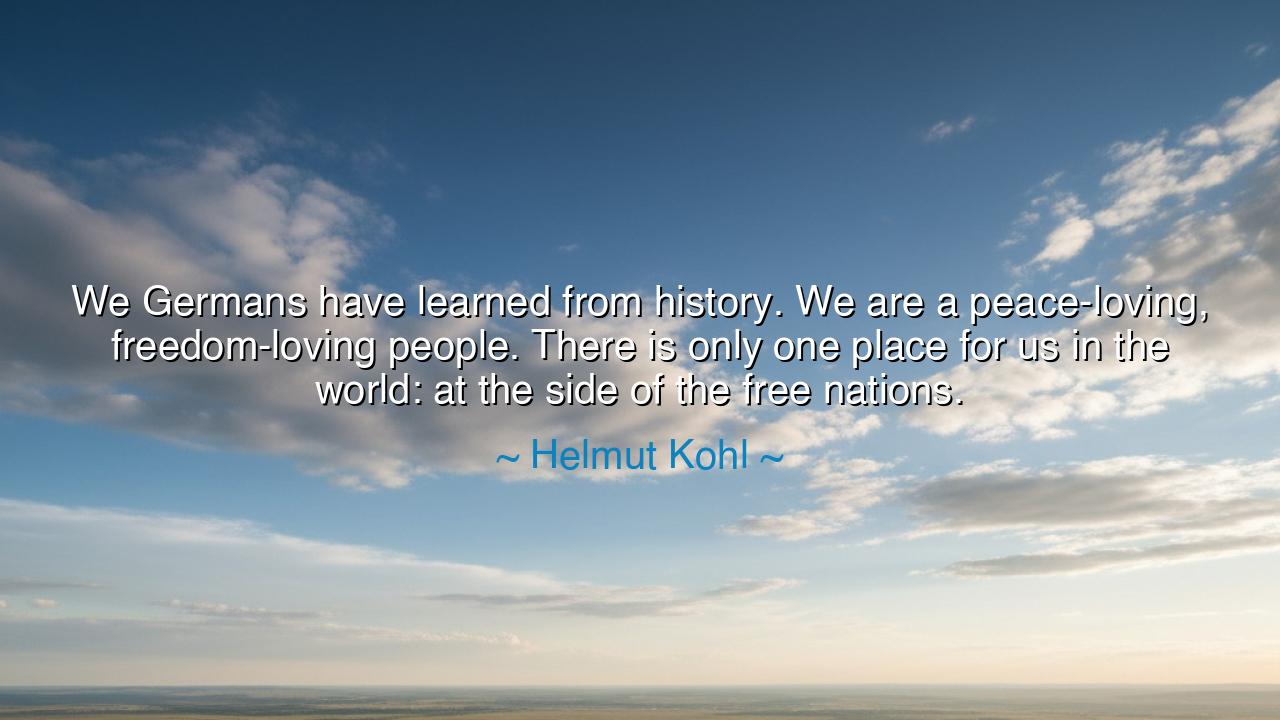
We Germans have learned from history. We are a peace-loving
We Germans have learned from history. We are a peace-loving, freedom-loving people. There is only one place for us in the world: at the side of the free nations.






“We Germans have learned from history. We are a peace-loving, freedom-loving people. There is only one place for us in the world: at the side of the free nations.” – Helmut Kohl
Listen, O children of remembrance and renewal, to the words of Helmut Kohl, the chancellor who shepherded Germany from division to unity. These words were spoken not in pride, but in reverence—a vow born from the ashes of history. When he declared, “We Germans have learned from history,” he was not merely speaking of the past, but of a transformation—a people once consumed by tyranny, now devoted to peace. His words are a testament to the human capacity for repentance, rebuilding, and rebirth.
Kohl’s message comes from a land that had known both glory and ruin. Twice in a single century, Germany had plunged the world into war. Twice, its ambition had turned to devastation. From the rubble of its cities and the guilt of its conscience, a new Germany was forged—one that sought not conquest, but cooperation; not power, but principle. Kohl, a man of faith and foresight, understood that redemption could not come through words alone. It required deeds—commitment to peace, freedom, and partnership with those nations once considered enemies. His declaration was a promise to the world: that the errors of the past would never again define the future.
When he says, “We are a peace-loving, freedom-loving people,” it is both a declaration and a confession. For peace and freedom are not born from ease—they are learned through suffering. The Germany of the postwar years did not inherit peace; it earned it. Through humility, reflection, and reconstruction, it transformed itself from the ruins of dictatorship into a pillar of democracy. This transformation was not automatic—it required the courage to face guilt, to teach truth, to rebuild trust. Kohl’s Germany was not the Germany of conquest, but of conscience—a nation reborn through its will to atone.
And when he proclaimed, “There is only one place for us in the world: at the side of the free nations,” he spoke of alignment—not of territory, but of values. The world stood divided then, between East and West, between oppression and liberty. Kohl’s Germany, standing at the fault line of the Cold War, chose the side of democracy, joining its fate to those who believed in human dignity and law. His words came not from submission, but from resolve—from the knowledge that freedom is fragile and must be defended not only with arms, but with memory.
Consider the story of Germany’s reunification in 1990, when the Berlin Wall—symbol of division and despair—was torn down. Many feared that uniting East and West would awaken old ambitions, that the ghosts of empire might rise again. But Kohl’s leadership proved otherwise. He guided the process not with triumphalism, but with humility, ensuring that unity would be a moral victory, not a political one. His guiding principle was peace: that the united Germany would not dominate Europe, but strengthen it; that its power would serve, not subdue. The success of that vision remains one of the great miracles of modern history.
In his statement lies a truth that transcends borders: that history is not a chain to be broken, but a teacher to be heeded. Nations, like individuals, must face their past with honesty if they wish to be free. Denial breeds repetition; remembrance breeds wisdom. Kohl’s words remind us that greatness does not come from power over others, but from responsibility to others. A nation’s honor lies not in conquest, but in character—in how it chooses to rise after it has fallen.
So let this be the lesson to all who hear: Learn from history, or be devoured by it. Every people, every generation, carries the burden of its past. Do not hide from it. Look upon your failures and transform them into strength. Choose peace over pride, unity over vengeance, humility over hubris. For only those who remember the darkness truly understand the value of light.
And thus, in the spirit of Helmut Kohl, let all nations—great and small—strive to stand “at the side of the free.” Let them build bridges where walls once stood, and cherish liberty not as a trophy, but as a trust. For peace is not inherited; it is cultivated, day by day, through wisdom, patience, and remembrance. This is the legacy of those who have truly learned from history—and the destiny of all who wish to remain free.






AAdministratorAdministrator
Welcome, honored guests. Please leave a comment, we will respond soon